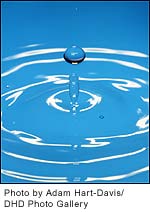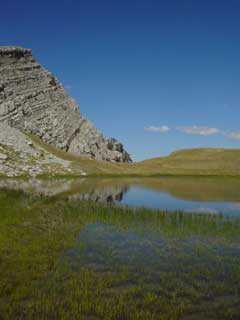 Euphrates-Tigris: A View from Syria
Euphrates-Tigris: A View from Syria
The View from Syria: Will the Country Die of Thirst?
Writer: M. Faisal Rifai
Classical Arabic has a range of words to describe thirst. According to linguists, it is also the only language in which “dying of thirst” can be expressed in a single word: al jouad.
This wide vocabulary to express the notion of thirst reflects the natural scarcity of water resources in many Arab countries, which is heightened by population growth and frequent drought. Syria is no exception in this: in the last 60 years, per person water availability has dropped from 1,850m3 per year in 1950 to 850m3 in 2003, placing it in the category of countries suffering chronic water scarcity (countries with less than 1,000m3 per person per year, according to UN classifications). Experts predict this figure will decrease further to an annual 400m3 per person by 2030, placing it in the category of countries under “extreme water stress”.
Most parts of Syria, including the major cities Damascus and Aleppo, have a water deficit, meaning that more water – from rainfall, underground reservoirs and rivers – is used every year than is naturally replenished. Around 90 percent of the country’s water resources is currently used in agriculture, a key sector that employs 25 percent of the labour force and accounts for 20 percent of the country’s GDP. As the country’s population – which has risen from 3.5 million in 1950 to 22 million today – continues to grow, demand for water is set to increase further over the coming years.
While all countries in the region are confronted with similar conditions, Syria – and Iraq – is unique in the eastern Mediterranean region for its high ‘dependency ratio’, with an estimated 65 percent of renewable water resources originating from beyond the country’s borders.
Bordering on Jordan and Palestine in the south, Lebanon in the southwest, Iraq in the east and Turkey in the north, Syria shares six of its 16 rivers with its neighbours. Key among these are the Euphrates and Tigris rivers in the northeast of the country, which both originate in Turkey and flow through Syria to Iraq.
The appropriation of the water of these rivers has been a subject of dispute over the last 60 years. Today, the region’s complex political context continues to exacerbate the discussions over water and development, while climate change forms an additional threat to development. For while the Euphrates-Tigris (ET) region encompasses several countries, it forms a single agro-ecological system that is increasingly threatened by high evaporation rates, water scarcity, recurrent droughts and seasonal variability of river flows.
To date, no formal binding trilateral agreement over water exists between Syria, Turkey and Iraq. Instead, existing informal agreements have allowed the three countries to implement their own development plans, with each country acting unilaterally in the domain of water and development.
Cooperation among the three countries would maximize joint benefits, reduce conflict, and lead to fair, balanced, and sustainable development practices, which in turn would provide social and economic benefits to all the people of the ET region.
Syria maintains its position towards Turkey that water needs and uses from the Euphrates and Tigris rivers should be based on the principles of the 1997 UN Convention on the Law of the Non-navigational Uses of International Watercourses which stipulates that watercourse states should use the resource in an “equitable and reasonable manner”.
A 1987 protocol between Syria and Turkey allowed Turkey to reduce the flow of the Euphrates waters to fill up the reservoir of the newly built Ataturk Dam and supply a fixed flow to Syria and Iraq. This protocol was however signed in the understanding that the interruption in flow would be temporary and that the allocation to Syria and Iraq would be reviewed upwards once the dam reservoir had been filled.
Syria and Iraq continue to suffer from Turkey’s large-scale dam construction projects, which do not take the water needs of downstream countries into account. The water that Turkey discharges from the Anatolian plains into Syria is contaminated by insecticides and fertilizers, which causes groundwater pollution and increases the salinity of the Euphrates River.
The future of water in Syria is bleak. The government has outlined a series of ambitious development programs to achieve the necessary economic growth to meet the needs of a growing population. Water is essential for the successful implementation of these programs. The expansion of irrigated land will increase water use and energy consumption. And while the improvement of irrigation efficiency will help limit the rise in water demand, changes in agricultural practices and cropping patterns may be hard to implement on the ground. In addition, the ideological values pertaining to development policies based on food security principles must change because they are in certain instances costly and unsustainable.
For decades, the corrupt and harsh regimes in the Arab world seemed immune to change. The outcome of the flash flood of popular uprisings that has swept through the region may lead to the toppling of other dictators with more bloodshed. The new political environment that may emerge in the region could lead to improved relations between Syria, Iraq and Turkey, and a more productive dialogue on water
Unless Syria takes measures to conserve water and use it wisely, the country may in the future face the eighth degree of thirst, al jouad.
M. Faisal Rifai is a former professor of water resources management at the University of Aleppo, Syria, who also worked as an international consultant on transboundary water.
Upon retiring in 2005, he co-founded the Euphrates-Tigris Initiative for Cooperation (ETIC) of which he is the executive director. ETIC is a non-governmental organization that aims to promote cooperation to achieve technical, social and economic development in the Euphrates Tigris region.
| Contact information | n/a |
|---|---|
| News type | Inbrief |
| File link |
http://www.revolve-magazine.com/2011/06/21/euphrates-tigris-syria/ |
| Source of information | http://www.revolve-magazine.com |
| Keyword(s) | drinking water, drought, Water governance, international co-operation, international organization, international politics |
| Subject(s) | DRINKING WATER , DRINKING WATER AND SANITATION : COMMON PROCESSES OF PURIFICATION AND TREATMENT , HEALTH - HYGIENE - PATHOGENIC MICROORGANISM , INFORMATION - COMPUTER SCIENCES , NATURAL MEDIUM , POLICY-WATER POLICY AND WATER MANAGEMENT , PREVENTION AND NUISANCES POLLUTION , WATER DEMAND , WATER QUALITY |
| Geographical coverage | Syria, |
| News date | 21/07/2011 |
| Working language(s) | ENGLISH |
 you are not logged in
you are not logged in





